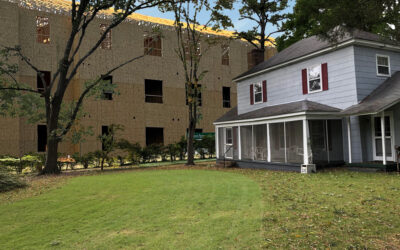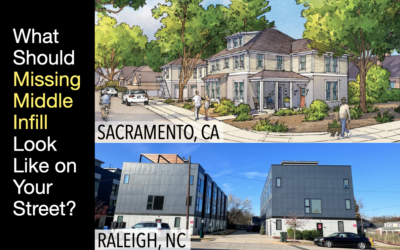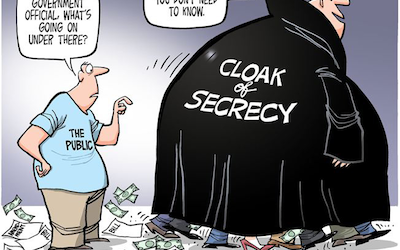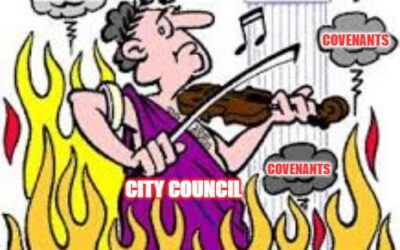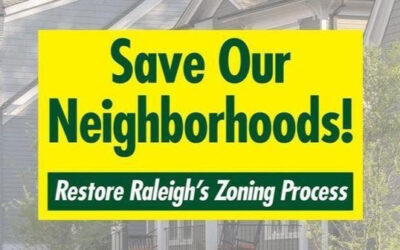A proposed Lorimer Spring development of 60 apartments for senior citizens is advancing with no official notification to nor input from neighborhood residents. It has inadequate parking and no real access to transit within safe walking distance. Especially for seniors.
The Attack on Single-Family Zoning
I have experience valuing homes that are next to duplexes, fourplexes and apartment buildings; I see what’s happening in these neighborhoods. Once zoning is changed from single-family to multi-family, developers move in and start competing against families for older homes. Unfortunately, the builder always wins because they have more money and are willing to pay cash. Homes, perfect for a starter family or in need of being rehabbed will be purchased by a developer who will tear the house down to make way for a new multi-unit building on a small 5,000-square-foot site. (It’s called the highest and best use of the land). The moment construction starts, the value of a nice condition single-family home next door goes down; the appraisal term is called external obsolescence. Welcome to capitalism in America.
I am not anti-development. And neither is Livable Raleigh
INDY Week, please stop referring to me as anti-development. You refer to me as “Livable Raleigh co-founder Stef Mendell, who ran on an anti-development platform.” This has got to stop. I am not and have never been anti-development. And neither is Livable Raleigh. Let’s try to work together and find reasonable ways to accommodate appropriate development. Labeling individuals or groups as anti-development only furthers polarization.
Fix This NOW!
Homeowners being sued by a builder in Woodcrest. This lawsuit is made possible by the City Council which allows major developments without neighborhood input or process and rezoned the missing middle without providing protections in established neighborhoods.
Will the New Council Fix our Crappy Missing Middle Infill Rules and End the Lawsuits?
Livable Raleigh and other proponents of Missing Middle best practices have lobbied Council for years to engage in a community conversation toward adopting Missing Middle infill improvements on the books in other peer cities that actually promote affordability, compatibility and walkable transit access. The latest, and perhaps best rules so far, have been adopted by Sacramento, CA.
How Raleigh’s Changes to “By-Right” Zoning Rules Affect Engagement and Trust
No one wants to be told their street is going to transform in the next five years, and there’s no way for them to even voice their thoughts and concerns. This pattern of transformation is going to take place, how we guide it is what’s most important. By adapting the zoning code to ensure that everyone comes together, working for the MUTUAL benefit of our city and its housing supply is not some far fetched ambition, but should be the baseline; the bare minimum respect shown to Raleigh’s amazing people. Transparency and working together is what is needed for beneficial growth. It is what the people of our city want.
UNNEIGHBORLY: The impact of Missing Middle on Woodcrest
Possible Missing Middle “tweaks” being discussed by Council include tree preservation and consideration of character impact of high-density housing on existing neighborhoods. These minor tweaks would amount to putting lipstick on a pig. Council was able to make controversial decisions on moving Red Hat Amphitheater and closing a traffic artery into downtown within about two months. You’ve had two years to massage and wrestle with Missing Middle, and nothing has been accomplished.
Ignoring covenants encourages their violation
If this lawsuit succeeds, then any subdivision with or without a homeowner’s association will be at risk. The only winners will be those charging legal fees, and the losers will be homeowners who purchased their single-family homes with certain expectations related to the future of their property.
City Council fiddles while neighborhoods are sued
Raleigh builder is suing a whole neighborhood to have their restrictive covenants removed to enable him to build a development of 12 townhomes on two lots that are/were two single-family homes. District C Councilor Corey Branch, who represents the neighborhood, promised to do everything in his power to fix this. Branch has done nothing.
WE WON!!! Wake County Superior Court Judge Rules against City of Raleigh
Wake County Superior Court judge, in a memorandum decision, indicated the City of Raleigh Board of Adjustment (“BOA”) erred last summer when it approved the City staff’s approval of the application to build a Missing Middle compact subdivision comprised of 17 townhomes at 908 Williamson Drive.

